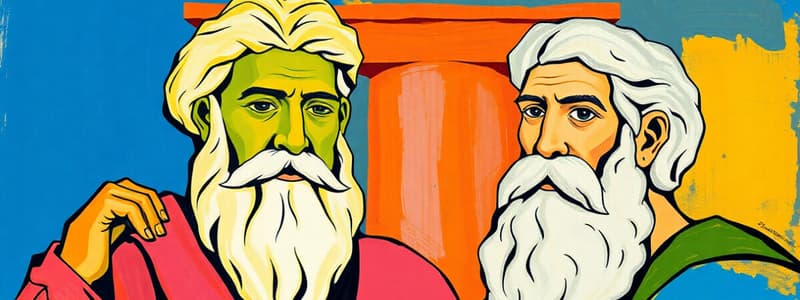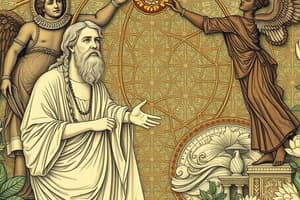Podcast
Questions and Answers
What does the term 'philosophy' literally mean?
What does the term 'philosophy' literally mean?
- Search for truth
- Understanding the universe
- Love of Wisdom (correct)
- The study of existence
Which philosopher is known for the idea that 'an unexamined life is not worth living'?
Which philosopher is known for the idea that 'an unexamined life is not worth living'?
- Socrates (correct)
- René Descartes
- David Hume
- Immanuel Kant
According to Plato, what is synonymous with the self?
According to Plato, what is synonymous with the self?
- Soul (correct)
- Body
- Mind
- Consciousness
What does René Descartes claim is the one thing we cannot doubt?
What does René Descartes claim is the one thing we cannot doubt?
Which philosopher argued that the self could not be separated from the body?
Which philosopher argued that the self could not be separated from the body?
What concept is associated with Immanuel Kant regarding the creation of reality?
What concept is associated with Immanuel Kant regarding the creation of reality?
What is a 'feral child'?
What is a 'feral child'?
David Hume's philosophy suggests what about the self?
David Hume's philosophy suggests what about the self?
What is considered the most significant feature in determining a person's social identity?
What is considered the most significant feature in determining a person's social identity?
Which phase of Arnold Van Gennep's rite of passage involves transitioning from one identity to another?
Which phase of Arnold Van Gennep's rite of passage involves transitioning from one identity to another?
According to Clifford Geertz, what are inherited conceptions expressed in symbolic forms referred to as?
According to Clifford Geertz, what are inherited conceptions expressed in symbolic forms referred to as?
What does the incorporation phase signify in the context of identity change?
What does the incorporation phase signify in the context of identity change?
Which factor is essential for the maintenance of group identity as mentioned in the content?
Which factor is essential for the maintenance of group identity as mentioned in the content?
What is the primary focus of children aged 6-9 years in relation to social behavior?
What is the primary focus of children aged 6-9 years in relation to social behavior?
According to Lev Vygotsky, what precedes individual development?
According to Lev Vygotsky, what precedes individual development?
What are considered elementary mental functions in infants?
What are considered elementary mental functions in infants?
Which of the following describes a sociocentric personality?
Which of the following describes a sociocentric personality?
Which level of learning occurs at the Interpsychological social level?
Which level of learning occurs at the Interpsychological social level?
What does the term 'Identity Toolbox' refer to?
What does the term 'Identity Toolbox' refer to?
Which mental function undergoes significant development as children grow older?
Which mental function undergoes significant development as children grow older?
In the nature vs. nurture debate, what does 'nature' refer to?
In the nature vs. nurture debate, what does 'nature' refer to?
What does the term 'self' primarily signify in the context of identity?
What does the term 'self' primarily signify in the context of identity?
According to George Herbert Mead, what does the 'me' refer to?
According to George Herbert Mead, what does the 'me' refer to?
In the preparatory stage of self-development, what activity do children primarily engage in?
In the preparatory stage of self-development, what activity do children primarily engage in?
What are the two faces of the self as proposed by Marcel Mauss?
What are the two faces of the self as proposed by Marcel Mauss?
What is the primary source of the development of the self according to George Herbert Mead?
What is the primary source of the development of the self according to George Herbert Mead?
How is the self described in terms of its relationship with external reality?
How is the self described in terms of its relationship with external reality?
What is the key feature of the play stage in self-development?
What is the key feature of the play stage in self-development?
What does the term 'alienation' imply in the context of the self?
What does the term 'alienation' imply in the context of the self?
Flashcards are hidden until you start studying
Study Notes
Ancient Greek Philosophy
- Philosophers from ancient Greece were the first to explore the concept of the self.
- Philosophy means "love of wisdom" and deals with exploring the ultimate causes, reasons, and principles of everything.
Socrates
- Socrates was the first philosopher to systematically question the self.
- He believed that an unexamined life is not worth living.
- Socrates' view of reality was divided into two realms: the physical and the ideal.
- The physical realm is ever-changing and temporary, while the ideal realm is unchanging and eternal.
- The ideal realm encompasses concepts like truth, goodness, and beauty.
Plato
- Plato believed the soul was synonymous with the self.
- He proposed three components of the soul:
- Rational Soul: seeks knowledge and truth
- Spirited Soul: embodies emotions and courage
- Appetitive Soul: deals with desires and urges
St. Augustine
- St. Augustine believed in the distinction between the mortal body and the eternal soul.
René Descartes
- Descartes, known as the "Father of Modern Philosophy," emphasized doubt as a crucial element in understanding the self.
- He argued that the only thing we cannot doubt is our own existence, stating "I think, therefore I am."
- Decartes saw the self as a combination of the "cogito" (thinking mind) and the "extenza" (physical body).
David Hume
- Hume argued that there is no inherent self and that our concept of self is merely a collection of perceptions and sensations.
Immanuel Kant
- Kant proposed that we actively construct our own reality through our minds.
- He believed that our minds possess inherent categories, like time and space, which are not found in the world itself but are built into our minds.
Gilbert Ryle
- Ryle argued that the "self" is not a separate entity but rather a way of describing our actions and behaviors, summarized by "I act, therefore I am".
Maurice Merleau-Ponty
- Merleau-Ponty argued that the mind and body are inseparable and work together to create our experience of self.
The Self as a Product of Society
- Sociology studies social groups and human relationships.
- The concept of the "feral child" highlights the crucial role of social interaction in developing a sense of self.
Marcos Rodriguez Pantoja
- Marcos Rodriguez Pantoja, a notable feral child, showcases the impact of social isolation on human development.
Qualities of the Self
- The self is considered separate: unique and distinct from other selves.
- The self is consistent, allowing for study, description, and measurement.
- The self is private, with inner thoughts, feelings, and experiences.
- The self is isolated from the external world, leading to a constant struggle between the self and external reality.
- The self is unitary, acting as the center of experiences and thoughts.
- The self is dynamic and constantly in flux, changing and evolving.
Marcel Mauss
- Mauss proposed two faces of the self: "moi" and "personne".
- "Moi" represents the individual's sense of self, including their body and basic identity.
- "Personne" represents the social role and persona taken on by the individual.
The Self and Development of the Social World
- George Herbert Mead believed that social interaction is fundamental to the formation of the self.
- He proposed two components of the self:
- "Me": the social self, learned through interactions with others and the environment.
- "I": the individual's response to the "me" and the attitudes of others.
Theory of Self Development:
- George Herbert Mead identified three stages in self-development:
- Preparatory Stage (0-3 years old): Children imitate others through mimicry.
- Play Stage (3-6 years old): Children engage in pretend play, developing their understanding of social roles.
- Game Stage (6-9 years old): Children become aware of the "generalized other" and consider how their behavior is viewed by society.
The Social Development Theory
- Lev Vygotsky emphasized the importance of social interaction in development.
- He proposed that social interaction precedes development, which happens in two levels:
- Interpsychological level: Social learning takes place.
- Intrapsychological level: Individual internalizes social learning.
Elementary Mental Functions
- Vygotsky believed infants are born with basic mental functions:
- Sensation: automatic perception of sensory information.
- Hunger: innate bodily process.
- Memory: natural ability to retain information.
Higher Mental Functions
- Vygotsky stated that through social interactions, individuals develop higher mental functions:
- Language: advanced through social learning.
- Memory: cultivated and controlled through social experiences.
- Attention: ability to focus on specific stimuli.
- Perception: social interactions enhance awareness and comprehension.
The Anthropological Conceptualization of the Self: The Self as Embedded in Culture
- Anthropology studies what makes us human.
- The nature vs. nurture debate explores the influence of biology and culture on the self.
Egocentric and Sociocentric Selves
- In different societies, the concept of self is viewed differently:
- Egocentric: Individuals with personalities shaped primarily by their inner selves.
- Sociocentric: Individuals whose personalities are strongly influenced by their social environment.
Identity Toolbox
- Individuals utilize an "identity toolbox" to construct their social self by choosing which aspects of their identity to emphasize.
Self-Identification
- Factors for self-identification include:
- Kinship: family ties and shared ancestry.
- Family membership: significant role in shaping social identity.
- Language and religious affiliation: important factors for group identity.
- Personal naming: a crucial means of individualizing and identifying a person.
Three-Phased Right of Passage
- Arnold Van Gennep's three-phased right of passage describes how individuals transition between identities:
- Separation Phase: detaching from the old identity.
- Liminality Phase: transitioning between identities.
- Incorporation Phase: formal acceptance of the new identity.
Self as Imbedded Culture
- Clifford Geertz defined culture as a system of shared ideas and symbols passed down through generations.
- He emphasized the interdependent relationship between human nature and culture.
- Geertz argued that culture shapes our sense of self, enabling us to achieve our full potential.
- He stated, "Without men, no culture, certainly, but equally, and more significantly, without culture, no men."
Studying That Suits You
Use AI to generate personalized quizzes and flashcards to suit your learning preferences.



